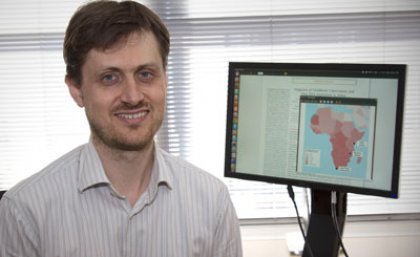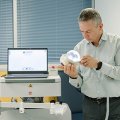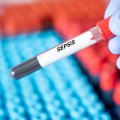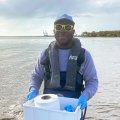
A distinctive genetic “signature” offers new hope for developing a rapid, affordable diagnostic test for the hundreds of thousands of children infected with tuberculosis each year.
The team that made the discovery included Dr Lachlan Coin from The University of Queensland’s Institute for Molecular Bioscience (IMB) and was led by Professor Michael Levin from Imperial College London.
“We urgently need better methods to diagnose TB in children,” Professor Levin said.
“These will allow treatment to begin earlier and avoid unnecessary treatment of children who are wrongly diagnosed.
“The symptoms of TB in children are common to many other childhood diseases, and the standard tests used on adults are not effective in children.
“Although the disease is treatable, thousands of children still die each year due to late diagnosis and many more are left with damage to their brain, bones and lungs.”
The five-year study was conducted by an international consortium of investigators from the UK, Africa, Australia and Singapore, who studied more than 2800 children admitted to hospitals in South Africa, Malawi and Kenya with symptoms of TB.
According to the World Health Organisation, TB is second only to HIV/AIDS as the greatest killer worldwide due to a single infectious agent.
The discovery of the gene expression signature in the blood of children with TB was published overnight in the prestigious New England Journal of Medicine.
Researchers found the signature by examining which genes were activated or suppressed in blood samples from African children with a confirmed diagnosis of TB.
They compared these patterns to those found in children with other diseases similar to TB and identified an expression signature of 51 genes indicative of active TB.
UQ’s Dr Coin led the statistical analysis that identified the signature.
“One of the main challenges was to distinguish TB from other infectious diseases, because the baseline inflammatory response to infection means that the difference in signatures is more subtle than between TB and healthy controls,” Dr Coin said.
“We also wanted to find the smallest number of genes needed to measure to diagnose active TB.
“A test that surveys fewer genes costs less. This is an important consideration given the majority of children with TB live in developing nations.”
The next step for the researchers is to turn their findings into an affordable, rapid test for TB that can be used worldwide.
Dr Coin also hopes to secure funding to trial the test in Papua New Guinea, where TB is estimated to be the largest cause of infectious disease mortality.
The study was funded by an EU Action for Diseases of Poverty grant and included researchers from UQ, Imperial College London, London School of Hygiene & Tropical Medicine, University of Sussex, Liverpool School of Tropical Medicine, Liverpool University, University of Cape Town, Malawi College of Medicine/Malawi-Liverpool-Wellcome Trust Clinical Research Programme, Blantyre, Wellcome Trust/KEMRI Research Unit, Kilifi and the Genome Institute of Singapore.
Make a tax-deductible donation to Dr Coin’s tuberculosis research here, or call +61 7 3346 2134.
To discuss commercial opportunities associated with this research, email Dr Mark Ashton here or phone him on +61 7 3346 2186.
The Institute for Molecular Bioscience (IMB) is a research institute of The University of Queensland that aims to improve quality of life by advancing medical genomics, drug discovery and biotechnology.
Twitter: @IMBatUQ / www.facebook.com/InstituteforMolecularBioscience
Media: IMB Communications Manager Bronwyn Adams, 0418 575 247, 07 3346 2134, b.adams@imb.uq.edu.au












